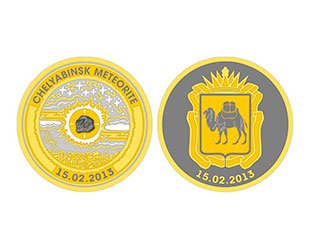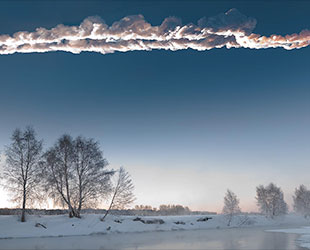February 12, 2014 — What is better than winning gold at the Olympics? Winning gold at the Winter Olympic Games in Sochi, Russia on Saturday (Feb. 15) — because on that day, and that day alone, earning a gold medal also means being awarded a piece of a rock that fell from space.
Saturday marks exactly one year since a small near-Earth asteroid entered the Earth's atmosphere over Russia and exploded over the Chelyabinsk Oblast (region). Regarded as the most widely-witnessed strike in modern history, the Chelyabinsk meteor was also the largest recorded natural object to have fallen from space since 1908.
The space rock broke into hundreds, if not thousands, of small fragments, which rained down over the area's snow-covered fields. Over the past year, many fragments of the Chelyabinsk meteorite have been recovered, with some of the pieces heading to labs for study, many landing on the collectors' market, others going to museums and a small set being placed aside for a special set of medallions.
Ten of those medals will be presented to those who place gold at the Sochi 2014 Olympics on the anniversary of the Chelyabinsk meteor fall.

Artwork for the meteorite medals to be presented to Sochi 2014 Olympic athletes by Chelyabinsk Oblast officials. (Image Grad) |
"We will hand out our medals to all the athletes who will win gold on that day [Feb. 15], because both the meteorite strike and the Olympic Games are global events," Alexei Betekhtin, culture minister for the Chelyabinsk region, said in a statement.
In total, 50 of the meteorite-adorned medallions have been minted. In addition to the those that will be awarded to the Olympic committees of those nations whose athletes win gold medals Saturday, one is being given to the regional Chelyabinsk museum, another will stay in Sochi and the remainder will be offered to private collections.
The medallions, which were crafted out of gold and silver, feature a design that was inspired by the footage of the meteor's fall as captured by car-mounted dash cams. The videos from that day quickly went viral, shared across the planet by social media.
The meteorite pieces are affixed in a small indentation at the center of the medals.
The meteorite medals are not replacing the Olympic gold medals awarded to athletes on Saturday, contrary to some media reports. The Chelyabinsk medals will be presented to the athletes separately and not as part of the traditional podium ceremony.
The ten meteorite-embedded awards will be bestowed to the gold medal athletes competing in speedskating (men's 1500), short-track speedskating (women's 1000 and men's 1500), cross-country skiing (women's relay), ski jumping (men's K-125), Alpine skiing (women's super giant slalom) and skeleton (men's) events.

The Chelyabinsk meteor streaked across Russia's skies in 2013, damaging buildings and injuring thousands. (M. Ahmetvaleev) |
Today, small fragments (2 to 3 grams) of the Chelyabinsk meteorite sell for $50 to $75. Larger fragments (between 5 and 10 grams) typically sell for $200 and above.
The shock wave from the meteor damaged thousands of buildings in the Chelyabinsk Oblast, resulting in more than 1,500 people seeking medical help. Injuries ranged from cuts due to shattered glass windows, eye pain due to the brightness of the flash, ultraviolet burns and, in one of two serious injuries reported, a broken spine.
The damage from the meteor explosion was estimated by the oblast's governor to be more than one billion rubles (or about $33 million US).
